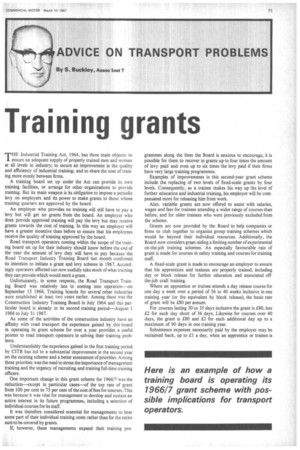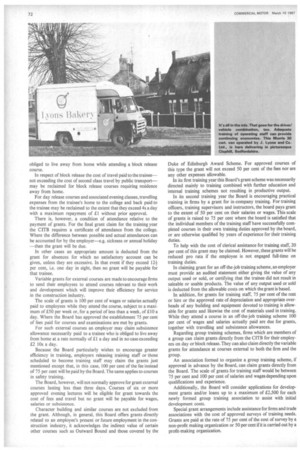Training grants
Page 73

Page 74

If you've noticed an error in this article please click here to report it so we can fix it.
Fr HE Industrial Training Act, 1964, has three main objects: to ensure an adequate supply of properly trained men and women at all levels in industry; to secure an improvement in the quality and efficiency of industrial training; and to share the cost of training more evenly between firms.
A training board set up under the Act can provide its own training facilities, or arrange for other organizations to provide training. But its main weapon is its obligation to impose a periodic levy on employers and its power to make grants to those whose training quarters are approved by the board.
An employer who provides no training will still have to pay a levy but will get no grants from the board. An employer who does provide approved training will pay the levy but may receive grants towards the cost of training. In this way an employer will have a greater incentive than before to ensure that his employees receive the quality of training approved by the board.
Road transport operators coming within the scope of the training board set up for their industry should know before the end of the year the amount of levy they will have to pay because the Road Transport Industry Training Board last month confirmed its intention to initiate a grant and levy scheme in 1967. Accordingly operators affected can now usefully take stock of what training they can provide which would merit a grant.
Unfortunately, in some respects, the Road Transport Training Board was relatively late in coming into operation—on September 15 1966. Training boards for several other industries were established at least two years earlier. Among these was the Construction Industry Training Board in July 1964 and this particular board is already in its second training period—August 1 1966 to July 311967.
As some of the activities of the construction industry have an affinity with road transport the experience gained by this board in operating its grant scheme for over a year provides a useful pointer to road transport operators in solving their training problems.
Understandably the experience gained in the first training period by CITB has led to a substantial improvement in the second year on the existing scheme and a better assessment of priorities. Among these priorities was the need to stress the importance of management training and the urgency of recruiting and training full-time training officers.
One important change in this grant scheme for 1966/7 was the reduction—except in particular cases—of the top rate of grant from 100 per cent to 75 per cent of the cost of fees for courses. This was because it was vital for management to develop and sustain an active interest in its future programmes, including a selection of individual courses for its staff.
It was therefore considered essential for managements to bear some part of their individual training costs rather than for the entire sum to be covered by grants.
If, however, these managements expand their training pro
grammes along the lines the Board is anxious to encourage, it is possible for them to recover in grants up to four times the amount of levy paid and even up to six times the levy paid if their firms have very large training programmes.
Examples of improvements in this second-year grant scheme include the replacing of two levels of fixed-scale grants by four levels. Consequently, as a trainee makes his way up the level of further education and industrial training, his employer will be compensated more for releasing him from work.
Also. variable grants are now offered to assist with salaries, wages and fees for trainees attending a wider range of courses than before, and for older trainees who were previously excluded from the scheme.
Grants are now provided by the Board to help companies or firms to club together to organize group training schemes which would be beyond their individual resources. Additionally, the Board now considers grant-aiding a limiting number of experimental on-the-job training schemes. An especially favourable rate of grant is made for courses in safety training and courses for training staff.
A fixed-scale grant is made to encourage an employer to ensure that his apprentices and trainees are properly trained, including day or block release for further education and associated offthe-job craft training.
Where an apprentice or trainee attends a day release course for one day a week over a period of 36 to 40 weeks inclusive in one training year (or the equivalent by block release), the basic rate of grant will be £80 per annum.
For courses lasting 30 to 35 days inclusive the grant is £80, less £2 for each day short of 36 days. Likewise for courses over 40 days, the grant is £80 and £2 for each additional day up to a maximum of 90 days in one training year.
Subsistence expenses necessarily paid by the employer may be reclaimed back, up to £1 a day, when an apprentice or trainee is obliged to live away from home while attending a block release course.
In respect of block release the cost of travel paid to the trainee— not exceeding the cost of second class travel by public transport— may be reclaimed for block release courses requiring residence away from home.
For day release courses and associated evening classes, travelling expenses from the trainee's home to the college and back paid to the trainee may be reclaimed to the extent that they exceed 4s a day with a maximum repayment of £.1 without prior approval.
There is, however, a condition of attendance relative to the payment of grants. For the final grant claim for the training year the CITB requires a certificate of attendance from the college. Where the difference between possible and actual attendances can be accounted for by the employer—e.g. sickness or annual holiday —then the grant will be due.
In other cases an appropriate amount is deducted from the grant for absences for which no satisfactory account can be given, unless they are excessive. In that event if they exceed 12+ per cent, i.e. one day in eight, then no grant will be payable for that trainee.
Variable grants for external courses are made to encourage firms to send their employees to attend courses relevant to their work and development which will improve their efficiency for service in the construction industry.
The scale of grants is 100 per cent of wages or salaries actually paid to employees while they attend the course, subject to a maximum of £50 per week or, for a period of less than a week, of £10 a day. Where the Board has approved the establishment 75 per cent of fees paid for courses and examinations are met by grants.
For such external courses an employer may claim subsistence allowance necessarily paid to a trainee who is obliged to live away from home at a rate normally of £1 a day and in no case exceeding £2 lOs a day.
Because the Board particularly wishes to encourage greater efficiency in training, employers releasing training staff or those scheduled to become training staff may claim the grants just mentioned except that, in this case, 100 per cent of the fee instead of 75 per cent will be paid by the Board. The same applies to courses in safety training.
The Board, however, will not normally approve for grant external courses lasting less than three days. Courses of six or more approved evening lectures will be eligible for grant towards the cost of fees and travel but no grant will be payable for wages, salaries or subsistence.
Character building and similar courses are not excluded from the grant. Although, in general, this Board offers grants directly related to an employee's present or future employment in the construction industry, it acknowledges the indirect value of certain other courses such as Outward Bound and those covered by the Duke of Edinburgh Award Scheme. For approved courses of this type the grant will not exceed 50 per cent of the fees nor are any other expenses allowable.
In its first training year this Board's grant scheme was necessarily directed mainly to training combined with further education and internal training schemes not resulting in productive output.
In its second training year the Board is encouraging practical training in firms by a grant for in-company training. For training officers, training supervisors and instructors, the board pays grant to the extent of 50 per cent on their salaries or wages. This scale of grants is raised to 75 per cent where the board is satisfied that the individual members of the training staff have successfully completed courses in their own training duties approved by the board, or are otherwise qualified by years of experience for their training duties.
To help with the cost of clerical assistance for training staff, 20 per cent of this grant may be claimed. However, these grants will be reduced pro rata if the employee is not engaged full-time on training duties.
In claiming grant for an off-the-job training scheme, an employer must provide an audited statement either giving the value of any output used or sold, or certifying that the trainee did not result in saleable or usable products. The value of any output used or sold is deducted from the allowable costs on which the grant is based.
In addition, for grants for training staff, 75 per cent of the rent or hire or the approved rate of depreciation and appropriate overheads of any building and equipment devoted to training is allowable for grants and likewise the cost of materials used in training. While they attend a course in an off-the-job training scheme 100 per cent of wages and salaries actually paid are due for grants, together with travelling and subsistence allowances.
Regarding group training schemes, firms which are members of a group can claim grants directly from the CITB for their employees on day or block release. They can also claim directly the variable grants for attendance at courses external to both the firm and the group.
An association formed to organize a group training scheme, if approved in advance by the Board, can claim grants directly from the Board. The scale of grants for training staff would be between 75 per cent and 100 per cent of salaries and wages depending upon qualifications and experience.
Additionally, the Board will consider applications for development grants and/or loans up to a maximum of £2,500 for each newly formed group training association to assist with initial development costs.
Special grant arrangements include assistance for firms and trade associations with the cost of approved surveys of training needs. Grants are paid at the rate of 75 per cent of the cost of survey by a non-profit making organization or 50 per cent if it is carried out by a profit-making organization.




































































































































